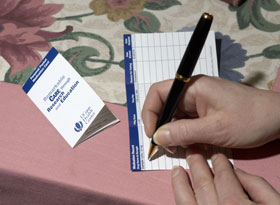Mini-Card Helps Keep Track Of Medications
About 44 percent of Americans take at least one prescription drug, and one person in six takes three or more, according to the government. Add over-the-counter medications, vitamins, supplements, and herbals, and the list gets long and can be confusing.
 To help keep track of a patient’s medications, the Health Center has devised
an easy-to-use sheet that catalogs medications. Patients just fill in the name,
strength, dose, frequency and reason for taking each medication. When folded over,
the sheet is the size of a business card and can easily be kept in a wallet or purse
for ready access.
To help keep track of a patient’s medications, the Health Center has devised
an easy-to-use sheet that catalogs medications. Patients just fill in the name,
strength, dose, frequency and reason for taking each medication. When folded over,
the sheet is the size of a business card and can easily be kept in a wallet or purse
for ready access.
“With more people taking more medications, it’s very important to keep track of them all,” says Dr. Karen Garibaldi of Internal Medicine Associates, the Health Center’s primary health care practice. “The card can help patients and their physicians avoid potentially dangerous outcomes from accidental double-dosing, skipping medication, or combining contra-indicated drugs and medications.”
The cards were first available as a clip-and-save piece in the November-December issue of UConn Housecall, the Health Center’s primary care newsletter that is sent to 70,000 households in the Farmington Valley. The card has also been made available for downloading from the Health Center’s website.
“We’ve had a very good response,” says Wendy Soneson, a marketing communications officer at the Health Center. “Patients have asked for them for their own use, as well as to give to family and friends. The card can also be useful in an emergency, when it can provide information on a patient who might not be able to speak for himself or herself.”
In addition to room to list prescription drugs, the cards have spaces for patients to list vitamins, supplements, over-the-counter products, and natural or alternative medicine remedies. They also have a place to record allergies. Cards should be updated after each doctor or hospital visit and should be shown to patients’ physicians, specialists, or pharmacists.
“When taking any medication, always be sure to read the information that comes with all prescription and nonprescription medicines,” Garibaldi says, “including cautionary information about drug and food interactions and possible side effects.”
To learn more about medication safety and other helpful information about prescription and nonprescription drugs, or to download a medication card, visit http://health.uchc.edu/. To receive a card by mail, call UConnLink at 800.535.6232.

